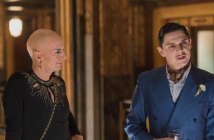October 17, 2015, 8:00 p.m. (EST), BBC
“The Girl Who Died” is structured brilliantly around an inescapable melancholy. This is an episode where, overtly at least, nothing bad happens, and yet sadness and loss suffuse it. This is a standard Doctor Who adventure where the basic theme is the inevitability of loss, where the victory is inevitably undercut by its impermanence. There’s a hidden weight to “The Girl Who Died,” which feels in many ways like a featherweight one-off of an episode, and yet is constantly waylaid by The Doctor’s looming depression over his inevitable loss of Clara, and his desperation to rage against the dying of the light.
Jamie Mathieson is quickly emerging as the heir apparent to Moffat’s throne. With “Mummy on the Orient Express” and “Flatline” already under his belt, “The Girl Who Died” makes his third straight solid story, and gives him an argument for the position of one of The Twelfth Doctor’s definitive writers. Mathieson is incredibly good at establishing a premise without being crippled by it. His stories are never simply about their log lines, but use their basic set ups to tell more interesting stories about the Doctor and his companion. There are wonderful little details scattered throughout this episode that elevate its most obvious moments—the Mire harvest testosterone to drink, for example, and Clara soundtracks their embarrassing defeat with “Yakety Sax.” At every turn, little things elevate “The Girl Who Died,” but they also serve as constant, subtle reminders that despite its trappings, this is not the joyous story of the Mire’s defeat by a ragtag band of Vikings. Everything from the dialogue of that baby, soaked as it is in existential dread, to the way Maisie Williams’ face changes in that final pan from confident joy to something much darker, is there as a reminder of the impermanence of all of these victories when stacked up against all the Doctor must lose in the process.
Williams is absolutely fantastic as Ashildir, taking a character that could easily be just Arya Stark-lite and making her completely unique. Ashildir is a fascinating mix of fear and confidence throughout, a character whose strength comes from stasis while the Doctor careens about space and time barely ever able to stand still. Williams doesn’t necessarily get the prominence she deserves in the role, but she makes every second count, making the prospect of her return next week even more exciting now that we’ve been given a sense of what she can do in the role.
Capaldi plays the Doctor as someone grappling with the deepest depression here, as a man out of time who knows all of his highs are terrifyingly impermanent, and that his lows will haunt him unto eternity. This victory is entirely undone by his knowledge that is presages a larger defeat, and his rash decision to make Ashildir immortal stems from his understanding that his time with Clara is coming to an end. It’s a credit to Mathieson that while the actual structure of the threat and its resolution here are fairly pat, the proceedings carry a much greater weight based on the Doctor’s anxiety about what he is doing now, and what it will mean going forward.
Clara also gets to be an active presence for the first time all season, basically solving the dispute with the Mire before Ashildir screws it up, and reminding the Doctor who he is in moments where he is flailing. She plays the role of the companion on this show, but she is also clearly capable of handling the whole situation on her own. Clara is not a woman propping up a “great man” in this story. She’s a strong, capable human being who wants to reach out and support her friend. Clara and The Doctor feel connected at a deeper level, in part because of the incredible chemistry between Capaldi and Coleman, but partly also because they are truly equals in a way no modern series companion has ever been able to be before. These two feel not just like best friends, but like a pairing that has become co-dependent in ways they cannot always describe. The Doctor lashes out here as a result of how desperately he needs her, and Clara cannot comfort him. She will leave him at some point. Their run through all of space and time will end. Everything is impermanent. The good times seem to fly by, while the darkness seems to linger inexorably.
“The Girl Who Died” is probably my favorite episode of the season so far (though “Under the Lake” was more stunning before its underwhelming second part), but it really has nothing to do with the Seven Samurai in a Viking village premise that undergirds it. Rather, this story will linger for the haunted look in Capaldi’s eyes throughout, for the ways he fights against losing anyone as much because it’s a reminder he will lose Clara as because he wants to be a hero. Love makes us do dangerous things. It’s easy to chase the highs and try to pretend that all of the lows aren’t right behind them. But wherever the Doctor lands, his past lands with him. He can’t outrun the inevitable, no matter how hard he tries. The Doctor saves who he can, but he loses people too. And often, the bad sticks with you in a way the good cannot. The brightest today can still be dimmed by dark yesterdays, and by the foreboding sense that every tomorrow brings another opportunity to lose.
The Roundup
- “I’m not actually the police. That’s just what it says on the box.”
- “We’re time travelers. We tread softly. It’s ok to make ripples, but not tidal waves.” “You are a tidal wave.”
- “People talk about premonition as if it’s strange. It’s not. It’s just remembering in the wrong direction.”
- “What’s the one thing that Gods never do? Gods never actually show up!”
- “Go. Go find Vikings on other planets. Trust me. The universe is full of testosterone. It’s unbearable.”
- “The Mire are coming for each and every one of you. So what are you going to do, raise crops at them?” “If necessary.” “I think he was being sarcastic.”
- “Do babies die with honor?”
- “I applaud your courage, but I deplore your stupidity. And I will mourn your deaths, which will be terrifying, painful, and without honor.”
- “Stay. You could help us. I know you could.” “I told you to run. That’s all the help you’ll get.”
- “The Earth is safe. Humanity is not in danger. It’s just one village.”
- “You just decided to stay. The baby stopped crying.”
- “I’ve got too much to think about without everybody having their own names.”
- “That could have gone better.”
- “Turning them into fighters, that’s not like you. What happened?” “You.”
- “A good death? Is that the best they can hope for? “A good death is the best anyone can hope for. Unless you happen to be immortal.”
- “Start winning, Doctor. It’s what you’re good at.”
- “You tell me to run to save my life. I tell you that leaving this place would be death itself.”
- “Winning is all about looking happier than the other guy.”
- “How’s it going?” “Reversing the polarity of the neutron flow. Bet that means something. Sounds great.”
- “I’m so sick of losing.” “You didn’t lose. You saved the town.” “I don’t mean the war. I’ll lose any war you like. I’m sick of losing people. Look at you. With your eyes, your never giving up, your anger, your kindness. And one day, the memory of that will hurt so much that I won’t be able to breathe. And I’ll do what I’ll always do. I’ll get in my box, and I’ll run, and I’ll run. In case all the pain ever catches up. And every place I go it will be there.”
- “I’m The Doctor. And I save people. And if anyone happens to be listening and you have a problem with that, to hell with you!”
- “Immortality isn’t living forever. That’s not what it feels like. Immortality is everybody else dying. She might meet someone she cannot bear to lose. That happens, I believe.”
“The Girl Who Died” is structured brilliantly around an inescapable melancholy.
-
GREAT




